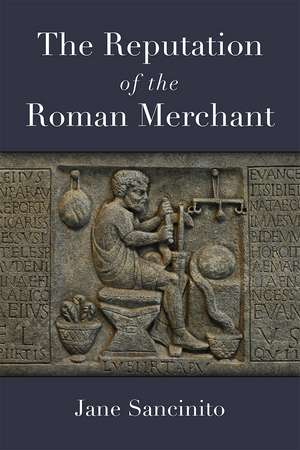The Reputation of the Roman Merchant: Law And Society In The Ancient World
Autor Jane Sancinitoen Limba Engleză Hardback – 2 ian 2024
Preț: 449.57 lei
Preț vechi: 583.85 lei
-23% Nou
Puncte Express: 674
Preț estimativ în valută:
86.02€ • 90.06$ • 71.18£
86.02€ • 90.06$ • 71.18£
Carte disponibilă
Livrare economică 15-29 martie
Preluare comenzi: 021 569.72.76
Specificații
ISBN-13: 9780472133482
ISBN-10: 0472133489
Pagini: 272
Ilustrații: 7 images
Dimensiuni: 152 x 229 x 28 mm
Greutate: 0.59 kg
Editura: UNIVERSITY OF MICHIGAN PRESS
Colecția University of Michigan Press
Seria Law And Society In The Ancient World
ISBN-10: 0472133489
Pagini: 272
Ilustrații: 7 images
Dimensiuni: 152 x 229 x 28 mm
Greutate: 0.59 kg
Editura: UNIVERSITY OF MICHIGAN PRESS
Colecția University of Michigan Press
Seria Law And Society In The Ancient World
Notă biografică
Jane Sancinito is Assistant Professor of History, University of Massachusetts-Lowell.
Cuprins
List of Illustrations
Acknowledgments
Introduction
Roman Reputation
Reputation and New Institutional Economics
Sources
Roman Perceptions of Trade
Chapter One: Merchants and the Roman Empire
The Pluralism of Roman Law
Legal Enforcement and Corruption
Controlling Roman Merchants
Conclusion
Chapter Two: The Nature of Reputation
Regularity, Consistency, and Predictability: The Foundations of Reputation
A Comparative Endeavor
Audience
Conclusion
Chapter Three: Developing a Reputation, Managing a Good Name
Making a Name for Yourself
Living Reputation
Reputation of the Dead
Conclusion
Chapter Four: Defying the Stereotype and Using Reputation
Stereotyping the Roman Merchant
Trust, Honesty, and New Institutional Economics
Social Capital and the Benefit of the Doubt
Conclusion
Chapter Five: Institutionalizing Reputation, or Information and What to Do with It
The Spread of Reputation
Prevention, Policing, and Punishment
Conclusion
Conclusion
Bibliography
Acknowledgments
Introduction
Roman Reputation
Reputation and New Institutional Economics
Sources
Roman Perceptions of Trade
Chapter One: Merchants and the Roman Empire
The Pluralism of Roman Law
Legal Enforcement and Corruption
Controlling Roman Merchants
Conclusion
Chapter Two: The Nature of Reputation
Regularity, Consistency, and Predictability: The Foundations of Reputation
A Comparative Endeavor
Audience
Conclusion
Chapter Three: Developing a Reputation, Managing a Good Name
Making a Name for Yourself
Living Reputation
Reputation of the Dead
Conclusion
Chapter Four: Defying the Stereotype and Using Reputation
Stereotyping the Roman Merchant
Trust, Honesty, and New Institutional Economics
Social Capital and the Benefit of the Doubt
Conclusion
Chapter Five: Institutionalizing Reputation, or Information and What to Do with It
The Spread of Reputation
Prevention, Policing, and Punishment
Conclusion
Conclusion
Bibliography
Recenzii
“What is the impact of rumor? What is the worth of a sterling reputation? And exactly how do you get people to trust you? These are all questions we continue to ask in the business world today, but were perhaps even more important to merchants in Roman antiquity. In new and important ways, Jane Sancinito’s The Reputation of the Roman Merchant explores the concept of reputation in the Roman Mediterranean, analyzing the stigma, the strictures, and the structural biases endured by many Roman merchants as well as the ways in which merchants themselves enforced strict social expectations. Sancinito reconstructs how but also why these merchants built networks of trust, the ways in which information flowed in Roman society, and the sheer power of social capital. The Reputation of the Roman Merchant considers the concept of reputation as institution. By reconstructing this institution and the patterns of behavior therein, Sancinito shows how we can employ the idea of reputation as a new tool with which to parse the actions, the exchanges, the business associations, and the enforcement of social norms within Roman economic networks. The Reputation of the Roman Merchant recreates the ancient agony and ecstasy of maintaining a good name in antiquity—and in the process provides new insights into the daily life of one of Rome’s most important agents.”
"Sancinito has produced a deeply persuasive case on a wholly original topic. As a piece of scholarship, this reviewer might also add that her monograph was a genuine pleasure to read and looks forward to reading her future work in the years to come."
Descriere
Defying a reputation for deceit and greed, Roman merchants strategized to present their good traits and successes





